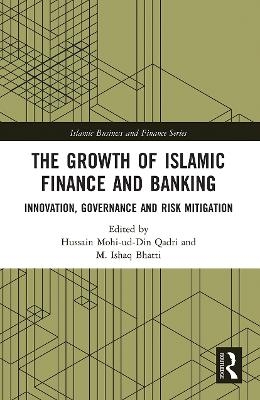
The Growth of Islamic Finance and Banking
Routledge (Verlag)
978-0-367-77744-9 (ISBN)
This book covers the recent literature concerning Islamic banking and finance (IBF), focuses on the history of IBF since its inception and introduces the latest innovative concepts and practices in the field.
The authors cover important topics such as the role of ownership, Shari`ah compliance and governance structures in raising debt capital using IBF practices, including Fatwa issues and the use of benchmarking practices. The book also addresses topics like archival data, the influence of leverage on ownership structure, and sukuk structures, as well as misconceptions, threats, challenges and opportunities in IBF. Finally, the book deals with prominent issues such as business score-carding, Takāful (Islamic Insurance), IBF implications for block-chain-based fintech and finance hub concepts in Islamic microfinance models.
This edited volume is an important contribution to the IBF literature as it provides a much-needed in-depth look into industry practices through the perspective of corporate finance and governance. With its interdisciplinary approach covering legal and financial issues along with a wide variety of notable contributors, this book will be a valuable reference guide to both teachers and students of Islamic banking and economics.
Hussain Mohi-ud-Din Qadri is an Associate Professor at the School of Economics and Finance, Minhaj University, Lahore, Pakistan. M. Ishaq Bhatti is an Associate Professor and the Founding Director of the Islamic Banking and Finance Programme at Latrobe University, Australia.
Introduction
Chapter 1
Standardization in the Islamic Banking & Financial System: The Methodology of Inclusion (Taqlid al-Madhahib)
Chapter 2
Recent Development in Islamic Finance and financial products
Chapter 3
On the role of ownership and governance structure in raising capital: A sukuk example
Chapter 4
Takāful (Islamic Insurance) on the Blockchain
Chapter 5
IT Based Finance Hub: A New Horizon towards Transparent Zakat Distribution Model *
Chapter 6
The Way Towards Standardizing Islamic Economic, Financial and Banking Fatawa
Chapter 7
The Fallacy of Conventional Benchmarks in Islamic Banking and Finance: Defining, Defending and Discussing with Evidence from Archival Data
Chapter 8
Influence of Leverage on Ownership Structure-Performance Relationship: A Panel Data Approach of Islamic & Conventional Banks of Pakistan
Chapter 9
Dynamic correlation and volatility linkage between stocks and sukuk
Chapter 10
Provision of Riba by Religious Faith: A Comparative Analysis
Chapter 11
Layers of Misconceptions about Islamic Banking: Are Islamic Banks Threats, Challenges and Opportunities for Investors
Chapter 12
Overview of Progress in Islamic Commercial and Social Finance in Pakistan
Chapter 13
Translation of Economic Verses by Shaykh-ul-Islam Dr Muhammad Tahir-ul-Qadri in the Light of Translation Studies: A Linguistic Translational Comparative Analysis
Chapter 14
Drawing inferences from Ali ibn Abi Talib’s Teachings on social, and collective responsibility for a fair and just economy
Chapter 15
Pricing anomaly: Tale of two similar credit-rated bonds with different yields
Chapter 16
Resolving Islamic Finance Disputes through Arbitration in the Middle East
Chapter 17
Formation of Tangible-Intangible Capital and Venture Philanthropy: An Innovation in Islamic Finance
Chapter 18
Theoretical, Practical vis-a-vis Legal Development in Islamic Banking: A case of Pakistan
Chapter 19
Islamic Safety Nets for the Poor: Pakistan’s Experience
Concluding Remarks on the Growth of the IBF Industry
| Erscheinungsdatum | 06.04.2021 |
|---|---|
| Reihe/Serie | Islamic Business and Finance Series |
| Verlagsort | London |
| Sprache | englisch |
| Maße | 156 x 234 mm |
| Gewicht | 517 g |
| Themenwelt | Sozialwissenschaften ► Soziologie ► Spezielle Soziologien |
| Wirtschaft ► Betriebswirtschaft / Management ► Finanzierung | |
| ISBN-10 | 0-367-77744-4 / 0367777444 |
| ISBN-13 | 978-0-367-77744-9 / 9780367777449 |
| Zustand | Neuware |
| Informationen gemäß Produktsicherheitsverordnung (GPSR) | |
| Haben Sie eine Frage zum Produkt? |
aus dem Bereich


